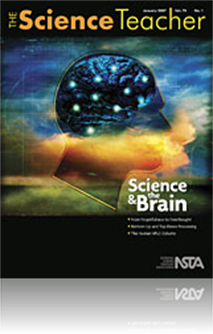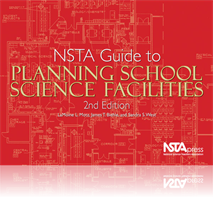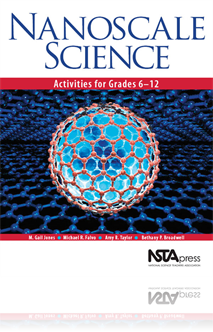All Resources
Journal Article
Editor’s Corner: Brainy Science
Despite being a subject of intense interest and scrutiny for all of human history, many aspects of human brain function are still rather poorly unders...
Book Chapter
Advocacy and the Planning Process
Science educators believe that students construct their knowledge of the natural world best in safe, secure, and stimulating learning environments. In...
Book Chapter
Current Trends and Future Directions in Science Education: Breaking Down the Walls
The simplest educational concept—and perhaps the most significant—to consider in designing tomorrow’s science programs is inquiry. In keeping wi...
Book Chapter
In order for students to inquire confidently, we must create safe classroom environments. Safety is not just a set of rules but a state of mind, and p...
Book Chapter
Designing Facilities for the Middle School (6-8)
A high-quality middle school science program requires science classrooms with safe, well-designed laboratory space, and school designers must consider...
Book Chapter
Designing Facilities for the High School (9-12)
When we participate in a school building program, we create learning environments that will last for many decades. So a major principle of good scienc...
Book Chapter
While everyone in a school community should share responsibility for the “greening” of a school, it is often the science teachers who make the bes...
Book Chapter
A periodic table on the ceiling of a chemistry lab/classroom, footprints and fossils of amphibians and animals in a courtyard sidewalk, a 60-foot slin...
Book Chapter
We say it often, and the phrase appears in the National Science Education Standards and many state and local documents as well. “All students should...
Book Chapter
Imagine metal eyeglass frames that you can roll in a ball, only to watch it uncoil back to its original shape! How can an inanimate object, such as me...
Book Chapter
Socks that don’t stink, graffiti-resistant paint, windows and sunscreen that reject UV rays… that’s nanotechnology. Students will learn about so...
Book Chapter
Nanotechnology has opened the door for medical applications that work at the molecular level to diagnose, treat, and prevent disease. This investigati...
Book Chapter
Building Small: Nano Inventions
Just as cells were discovered with early light microscopes and Saturn’s rings by the first telescopes, the nanoscale world has emerged due to new to...
Book Chapter
Too Little Privacy: Ethics of Nanotechnology
Advances in nanotechnology allow us to create unique and tiny labels for manufactured materials, create tiny sensors that can detect the presence of s...
Book Chapter
Just how big is a billion? How tiny is a nanometer? Five hands-on inquiry activities are presented that use measurement and calculations to help stude...




